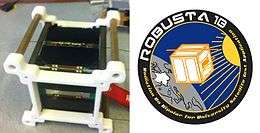ROBUSTA-1B
 | |
| Mission type | Technology |
|---|---|
| Operator | Centre Spatial Universitaire Montpellier-Nîmes |
| Mission duration | 2 years |
| Spacecraft properties | |
| Spacecraft type | 1U CubeSat |
| Launch mass | 1 kilogram (2.2 lb) |
| Start of mission | |
| Launch date | December 2015 |
| Rocket | Falcon 9 |
| Contractor | SpaceX |
| Orbital parameters | |
| Reference system | Geocentric |
| Regime | Low Earth |
ROBUSTA-1B (Radiation on Bipolar Test for University Satellite Application) is a nano-satellite (Cubesat) scientific experiment developed by the University of Montpellier students, a successor to the ROBUSTA satellite, which was launched in February 2012 and lost soon after.[1]
ROBUSTA-1B will carry an updated version of the ROBUSTA payload, an experiment to check the deterioration of electronic components, based on bipolar transistors, when exposed to in-flight space radiation. The results of the experiment will be used to validate a new radiation test method proposed by the laboratory.[2]
ROBUSTA Comparison
Started as a simple reflight of ROBUSTA,[3] the project quickly became a complete upgrade of most of the satellite's systems, using the feedback provided by the previous project.
References
- ↑ On the (now defunct) ROBUSTA website : https://web.archive.org/web/20130814173904/http://www.ies.univ-montp2.fr/robusta/satellite/
- ↑ "The Use of a Dose-Rate Switching Technique to Characterize Bipolar Devices". Bibcode:2009ITNS...56.3347B. doi:10.1109/TNS.2009.2033686.
- ↑ http://space.skyrocket.de/doc_sdat/robusta.htm